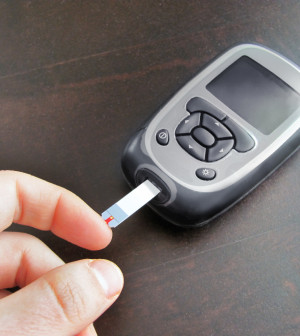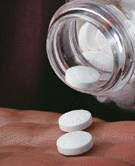- Double Mastectomy May Offer No Survival Benefit to Women With Breast Cancer
- Toxic Lead Found in Cinnamon Product, FDA Says
- Certain Abbott Blood Sugar Monitors May Give Incorrect Readings
- Athletes Can Expect High Ozone, Pollen Counts for Paris Olympics
- Fake Oxycontin Pills Widespread and Potentially Deadly: Report
- Shingles Vaccine Could Lower Dementia Risk
- Your Odds for Accidental Gun Death Rise Greatly in Certain States
- Kids From Poorer Families Less Likely to Survive Cancer
- Tough Workouts Won’t Trigger Cardiac Arrest in Folks With Long QT Syndrome
- At-Home Colon Cancer Test Can Save Lives
Daily Aspirin Regimen Not Safe for Everyone, FDA Warns


Taking an aspirin a day can help prevent heart attack and stroke in people who have suffered such health crises in the past, but not in people who have never had heart problems, according to the U.S. Food and Drug Administration.
“Since the 1990s, clinical data have shown that in people who have experienced a heart attack, stroke or who have a disease of the blood vessels in the heart, a daily low dose of aspirin can help prevent a reoccurrence,” Dr. Robert Temple, deputy director for clinical science at the FDA, said in an agency news release.
A low-dose tablet contains 80 milligrams (mg) of aspirin, compared with 325 mg in a regular strength tablet.
However, an analysis of data from major studies does not support the use of aspirin as a preventive medicine in people who have not had a heart attack, stroke or heart problems. In these people, aspirin provides no benefits and puts them at risk for side effects such as dangerous bleeding in the brain or stomach, the FDA said.
Also, there’s no evidence that taking aspirin every day is safe and effective for people who have not had heart problems or a stroke but have a family history of heart attack or stroke, or have evidence of arterial disease, Temple said.
He noted that a number of large studies are being conducted to assess the use of aspirin in preventing heart attack and stroke in people with no previous history of heart problems, and that the FDA is monitoring those clinical trials.
Anyone thinking about taking low-dose aspirin needs to discuss the risks and benefits with their doctor, Temple emphasized. It’s also important to have your doctor determine the dose and frequency that’s appropriate for you.
If your doctor does recommend daily aspirin to reduce your risk of heart attack and stroke, closely examine drug labels. Some drugs combine aspirin with other pain relievers or ingredients and should not be used for long-term aspirin therapy, the FDA said in the news release.
More information
The U.S. Office of Disease Prevention and Health Promotion has more about daily aspirin use.
Source: HealthDay
Copyright © 2024 HealthDay. All rights reserved.










